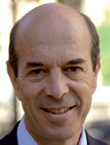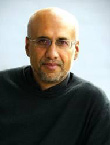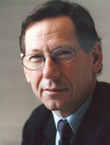KEYNOTE SPEAKERS
DR. IAN GOLDIN, Director of the James Martin 21st Century School, University of Oxford
 "Global Evaluation and Turkey"
"Global Evaluation and Turkey"
Dr. Ian Goldin served as Vice President of the World Bank (2003-2006) and acted as the Bank's Director of Development Policy (2001-2003). As Director of Development Policy, Dr. Goldin played a pivotal role in the research and strategy agenda of the Bank. During his tenure in this position, Dr. Goldin was directly responsible for the Bank's relationship with the UK and all other European, North American and developed countries. Dr. Goldin led the Bank's collaboration with the United Nations and other partners.
From 1996 to 2001 he was Chief Executive and Managing Director of the Development Bank of Southern Africa and served as an adviser to President Nelson Mandela. He succeeded in transforming the Bank into becoming the leading agent of development in the 14 countries of Southern Africa. During this period, Dr. Goldin served on several Government committees and Boards, and was the Finance Director for South Africa's Olympic Bid.
Previously, Dr. Goldin was the Principal Economist at the European Bank for Reconstruction and Development (EBRD) in London and Program Director at the OECD Development Centre in Paris, where he directed the Programs on Trade, Environment and Sustainable Development.
Born in South Africa, Dr. Ian Goldin has a BA and a BSc from the University of Cape Town, a MSc from the London School of Economics, and a PhD from the University of Oxford.
He has received wide recognition for his contributions to development and research, including having been knighted by the French Government and nominated "Global Leader of Tomorrow" by the World Economic Forum.
Dr. Goldin has published over 50 articles and 12 books, the two most well-known being "Globalisation for Development: Trade, Finance, Aid, Migration and Ideas" (2007) and "The Economics of Sustainable Development" (1995). In addition to being Director of the School, Dr. Goldin holds a Professorial Fellowship at the Balliol College of Oxford.
He is an outstanding speaker on global future trends in technology, science, climate change, demography and other factors impacting corporations and government policies.
PROF. SOHAIL INAYATULLAH, Future Scientist at Tamkang Univ. Graduate Inst. of Futures Studies
 "A Foresight for Companies"
"A Foresight for Companies"
Prof. Sohail Inayatullah, a political scientist, is at Graduate Institute of Futures Studies of Tamkang University (Taiwan) and acts as a visiting academic at Queensland University of Technology (Australia). Professor Inayatullah is a Fellow of the World Futures Studies Federation, the World Academy of Art and Science and the International Advisory Council of the World Future Society.
In Australia he has run Futures-Oriented Policy courses for several city councils and the Ministry of Agriculture. He co-teaches an annual foresight course (futures thinking and strategy development) for CEOs and senior managers at Melbourne Business School.
In 1999, Prof. Inayatullah held the UNESCO Chair at the Centre for European Studies, University of Trier, Germany and the Tamkang Chair in Futures Studies at Tamkang University, Taiwan.
Prof. Inayatullah has conducted planning-visioning workshops in more than a dozen countries. In the 1990s, he taught international courses on a range of issues including education, ecology, development, and policymaking for the World Futures Studies Federation.
Prof. Inayatullah is co-editor of the "Journal of Futures Studies" and associate editor of "New Renaissance". In addition, he is on the editorial boards of "Futures, Development, Peace and Democracy in South Asia" and "Foresight". He is the theme editor of "Globalization and World Systems" for the UNESCO Encyclopedia of Life Support Systems. He has also contributed to the Macmillian Encyclopedia of the Future, The Routledge Encyclopedia of Philosophy and the Oxford Encyclopedia of Peace Studies.
He has written more than 300 journal articles and magazine editorials. These have appeared in over 40 different journals. His articles have been translated into a variety of languages, including Spanish, Italian, Russian, Hindu and Japanese.
PROF. LUC SOETE, Director of UNU-MERIT
 "Technology and Development Strategies for Companies"
"Technology and Development Strategies for Companies"
Prof. Luc Soete (1950) is Director of UNU-MERIT, one of the 13 Research and Training Centres of the United Nations University, located in Maastricht, The Netherlands. UNU-MERIT was set up in 2005 following the integration of UNU-INTECH and MERIT.
Luc Soete has been Professor of International Economics at the Faculty of Economics and Business Administration at Maastricht University since 1986. He completed his first degrees in economics and development economics at the University of Ghent, Belgium, before obtaining his Ph.D. in economics at the University of Sussex (1978).
Before coming to Maastricht, Prof. Luc Soete worked at the Department of Economics of UFSIA, University of Antwerp (1973-79), the Institute of Development Studies (1979-84) and the Science Policy Research Unit (1980-86) at the University of Sussex, England. He was also a Visiting Associate Professor at the Department of Economics at Stanford University (1984-85).
In 1988 he set up MERIT, a research institute of the University of Maastricht in the area of innovation studies and socio-economic analysis of technological change, and has been the director since.
Prof. Soete has published a large number of books, articles and policy reports on the subject of industrial innovation and its economic implications. His research interests include both the theoretical and empirical study of technological change and innovation, with particular emphasis on new information and communication technologies, growth, employment and international trade and investment.
